|
|
|
Sort Order |
|
|
|
Items / Page
|
|
|
|
|
|
|
| Srl | Item |
| 1 |
ID:
169230
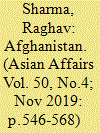

|
|
|
|
|
| Summary/Abstract |
This article discerns the shifts in China's engagement with its Western neighbour, Afghanistan. Beijing's approach has gradually shifted from dis-interest to a careful re-calibration of strategy indicating Afghanistan's growing eminence in its strategic calculus. This transposition – dating back to the 1980's – it is argued has been accentuated as the ‘West’ weans itself away from the Afghan theatre. This article demonstrates that Beijing's chequered history of engagement with Kabul has been historically underpinned by its engagement with a plethora of actors identified with ‘political Islam’ who in turn are patronized by its allies in Rawalpindi. Its deepening footprint in contemporary Afghanistan while continuing to be coloured by the prism of Rawalpindi, is informed by a growing sense of unease regarding the perceived adverse imprint that developments across China's Western borders are likely to leave on its domestic security and growing economic interests in the region.
|
|
|
|
|
|
|
|
|
|
|
|
|
|
|
|
| 2 |
ID:
114859
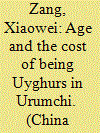

|
|
|
|
|
| Publication |
2012.
|
| Summary/Abstract |
This article asks: is the cost of being Uyghurs higher for young Uyghurs than for old Uyghurs in Ürümchi? I address this question with data from a survey of 2,947 people conducted in Ürümchi in 2005. The cost of being Uyghurs refers to the extent of economic inequality in the earnings of Han Chinese and Uyghurs. I develop three hypotheses on the effect of age on earnings differentials between Han Chinese and Uyghurs. Data analyses show that although young Uyghurs are better educated and earn more than old Uyghurs, they are more likely than old Uyghurs to suffer from being Uyghurs in Ürümchi. This finding has policy implications for the reduction of ethnic disparity in Xinjiang.
|
|
|
|
|
|
|
|
|
|
|
|
|
|
|
|
| 3 |
ID:
158092
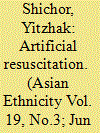

|
|
|
|
|
| Summary/Abstract |
Pan-Turkism emerged in the middle of the 19th century as an attempt to uniting all Turkic people along the Silk Road from the Mediterranean to China. After the ascent of modern Turkey under Mustafa Kemal as well as the Soviet incorporation of Central Asia, pan-Turkism had practically withered – although apparently not as an ideology. Indeed, the collapse of the Soviet Union and the subsequent independence of the Central Asia republics have provided for the revival of the pan-Turkism vision, perceived by Beijing as a threat not only to its interests in Central Asia but, moreover, to Xinjiang’s internal stability and China’s sovereignty. While this vision could hardly be accomplished, China’s intensive preoccupation with pan-Turkism has facilitated its artificial resuscitation, though it appears already deceased. Xi Jinping’s One Belt One Road initiative aims, among other things, at blocking pan-Turkism.
|
|
|
|
|
|
|
|
|
|
|
|
|
|
|
|
| 4 |
ID:
148510
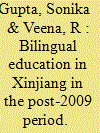

|
|
|
|
|
| Summary/Abstract |
This article analyses strategies of minority education currently in place in Xinjiang in the context of the second generation ethnic policy debate in China. The article argues that the 2009 ethnic riots in Xinjiang coupled with the change of leadership in China has significantly hardened the state’s approach to aggressively promoting Putonghua (standard Chinese). This policy is facing significant structural and political challenges in its implementation and acceptance in Xinjiang. The policy to universalise Putonghua in all Xinjiang schools is likely to produce more resistance to the statist agenda rather than resulting in the intended outcome of integration.
|
|
|
|
|
|
|
|
|
|
|
|
|
|
|
|
| 5 |
ID:
159157
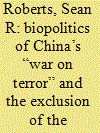

|
|
|
|
|
| Summary/Abstract |
This article provides an overview of People’s Republic of China (PRC) counter-terrorism policies targeting Uyghurs since 2001 when the state first asserted that it faced a terrorist threat from this population. In reviewing these policies and their impact, it suggests that the state has gradually isolated and excluded Uyghurs from PRC society. Drawing on the writings of Michael Foucault, it articulates this gradual exclusion of Uyghurs as an expression of biopolitics where the Uyghur people as a whole have come to symbolize an almost biological threat to society that must be quarantined through surveillance, punishment, and detention. Rather than suggesting that these impacts of China’s “war on terror” coincide with the intent of state policy, the article argues that they are inevitable outcomes of labeling a given ethnic population as a terrorist threat in the age of the Global War on Terror.
|
|
|
|
|
|
|
|
|
|
|
|
|
|
|
|
| 6 |
ID:
142180
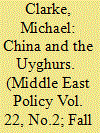

|
|
|
|
|
| Summary/Abstract |
Over a decade ago Dru C. Gladney argued that China faced the prospect of Xinjiang (or East Turkestan as many Uyghurs would prefer it) becoming its own West Bank if it failed to address the problems stemming from its forceful attempts to integrate the region. In a neat summation of Beijing's core dilemma, he suggested, “If China does not explore other options besides repression, restriction and investment, millions of Uyghur Muslims might become disenfranchised, encouraging some to look to the intifada, the Taliban or al-Qaeda for inspiration.” Chinese dissident Wang Lixiong in his 2007 book, My West China: Your East Turkestan, also pointed to the likely “Palestinization” of conflict in Xinjiang in which “the full mobilization of a people and the full extent of its hatred” would be directed against the state.
|
|
|
|
|
|
|
|
|
|
|
|
|
|
|
|
| 7 |
ID:
150943


|
|
|
| 8 |
ID:
164495
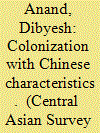

|
|
|
|
|
| Summary/Abstract |
China as a victim rather than a proponent of modern colonialism is an essential myth that animates Chinese nationalism. The Chinese statist project of occupying, minoritizing and securitizing different ethno-national peoples of Central Asia, such as Uyghurs and Tibetans, with their own claims to homelands, is a colonial project. Focusing on China’s securitized and militarized rule in Xinjiang and Tibet, the article will argue that the most appropriate lens through which this can be understood is neither nation-building nor internal colonialism but modern colonialism. It argues that the representation of Uyghurs and Tibetans as sources of insecurity not only legitimizes state violence as a securitizing practice but also serves contemporary Chinese colonial goals.
|
|
|
|
|
|
|
|
|
|
|
|
|
|
|
|
| 9 |
ID:
192866


|
|
|
|
|
| Summary/Abstract |
This paper argues that in China’s Xinjiang Uyghur Autonomous Region, work placements of re-education detainees and Xinjiang’s implementation of the national Poverty Alleviation through Labor Transfer programme for the transfer of rural surplus labourers operate under fundamentally different policies. Drawing on new documentary and witness evidence, it is argued that within Xinjiang’s unique context of frontier settler colonialism, its recent coercive labour transfer programme evolved alongside decades-long efforts to facilitate surplus labour transfers throughout China. From 2014, when Beijing shifted the region’s work focus towards de-extremification, Uyghur underemployment was framed as a matter of social stability and national security. Between 2017 and 2019, labour transfer coercion dramatically increased alongside campaigns of mass internment and of enforcing poverty alleviation work goals. Xinjiang’s shift in 2021 from a campaign-style mobilizational to an institutionalized approach deepens coercive risks of this often poorly understood coercive labour strategy.
|
|
|
|
|
|
|
|
|
|
|
|
|
|
|
|
| 10 |
ID:
119696
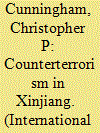

|
|
|
| 11 |
ID:
105179


|
|
|
|
|
| Publication |
2011.
|
| Summary/Abstract |
In September 2009, the Information Office of the State Council of the People's Republic of China claimed that Xinjiang benefits from respect and harmony between the ethnic groups. This rhetoric is faithfully propagated by national media: they uniformly praise the unity amongst the Han and Uyghurs through the common slogans of minzu tuanjie (ethnic unity ) and hexie guanxi (harmonious relations). Going beyond the official documents and propaganda, my purpose is to explore the relations between these two ethnic groups. I will focus on the ideas, words and actions of Han and Uyghur young people living in Urumqi who are often under-represented in official sources, or other forms of written and scholarly discourse. While comparing their behaviour, I argue that ethnic disharmony between Hans and Uyghurs exists, but it is simplistic to blame only the Chinese government or one of the ethnic groups, and naïve to ask what China can do to solve the problem. Instead, by exploring what the social agents in the young educated society in Xinjiang truly think of ethnic relations between them and the "other," this paper presents a comprehensive picture of the issue. My ethnographic research interprets how people remember, interpret and sometimes exaggerate their ethnic traditions and cultural practices in daily life in relation to the other ethnic group. The findings demonstrate how young people are determining the course of ethnic relations by constructing movable social barriers that result in segregation between them, raising doubts about the future possibilities for ethnic harmony.
|
|
|
|
|
|
|
|
|
|
|
|
|
|
|
|
| 12 |
ID:
164691


|
|
|
|
|
| Summary/Abstract |
The past decade of development schemes has been experienced very differently by various groups within the city of Kashgar in the Xinjiang Uyghur Autonomous Region of China. The recent exacerbation of social inequalities, stratification, and tensions in Kashgar is a structural consequence of two phases of government policies: an accelerated formalization of the economy and remodelling of the city-scape as part of modernistic development implemented before 2014, followed by a phase of strong securitization. Based on long-term ethnographic fieldwork between 2009 and 2017, this paper analyzes the situation, reactions, and strategies of different groups of Uyghur residents of Kashgar to cope with the changing socio-economic and political environment.
|
|
|
|
|
|
|
|
|
|
|
|
|
|
|
|
| 13 |
ID:
180659
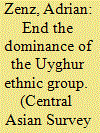

|
|
|
|
|
| Summary/Abstract |
Chinese academics and politicians argue that Xinjiang’s ‘terrorism’ problem can only be solved by ‘optimizing’ its ethnic population structure. High ethnic minority population concentrations are considered a national security threat. ‘Optimizing’ such concentrations requires ‘embedding’ substantial Han populations, whose ‘positive culture’ can mitigate the Uyghur ‘human problem’. Scenarios that do not overburden the region’s ecological carrying capacity entail drastic reductions in ethnic minority natural population growth, potentially decreasing their populations. Population ‘optimization’ discourses and related policies provide a basis to assess Beijing’s ‘intent’ to destroy an ethnic minority population in part through birth prevention per the 1948 United Nations Genocide Convention. The ‘destruction in part’ can be assessed as the difference between projected natural population growth without substantial government interference and reduced growth scenarios in line with population ‘optimization’ requirements. Based on population projections by Chinese researchers, this difference could range between 2.6 and 4.5 million lives by 2040.
|
|
|
|
|
|
|
|
|
|
|
|
|
|
|
|
| 14 |
ID:
137218
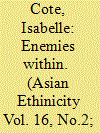

|
|
|
|
|
| Summary/Abstract |
How can we account for the targeted pattern of violence in Xinjiang, in which Uyghur secessionist groups attack some second-order minorities such as the Han Chinese and the Hui, but not the sizeable populations of Kazak, Kyrgyz, and Mongol minorities? Based on a variety of primary and secondary sources, I argue that members of the Han minority, being the national majority in China but a ‘nested minority’ in Xinjiang, are doomed to become a primary target of secessionist attacks as they represent, in and of themselves, the state from which Uyghur nationalists are trying to secede. Han Chinese’s – and to a lesser extent the Hui’s – economic and political dominance over the Uyghurs, along with their lack of historical ties to Xinjiang, also motivates their targeting while reinforcing the bond between other indigenous and comparatively disadvantaged minorities.
|
|
|
|
|
|
|
|
|
|
|
|
|
|
|
|
| 15 |
ID:
115821


|
|
|
|
|
| Publication |
2012.
|
| Summary/Abstract |
This article examines the changing relationship between ethno-national and local narratives in the historiography of Kazakhstan's Uyghurs through the parallel analysis of general and local histories compiled in the Soviet and post-Soviet periods. Uyghur history writing in the post-Soviet period is discussed in relation to the divided loyalty of the Uyghur community: while interest in writing ethno-nationalist histories is based on the growing feeling of being a part of the broad, transnational category of the Uyghur, deep attachment to the Semirech'e region is expressed in the emerging histories of Uyghur villages and neighbourhoods. In analysing the local histories of Kazakhstani Uyghurs in the post-Soviet period, the author focuses on the gradual transition from Soviet-style local histories praising the uniqueness of the 'Soviet' Uyghurs to new local histories emerging 'from below' as exemplified by the history of the Sultanqorghan neighbourhood of Almaty.
|
|
|
|
|
|
|
|
|
|
|
|
|
|
|
|
| 16 |
ID:
108209
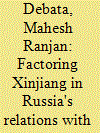

|
|
|
| 17 |
ID:
151164
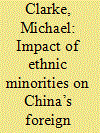

|
|
|
|
|
| Summary/Abstract |
This article argues, through a case study of the evolving impact of the Xinjiang and Uyghur issue, that the People’s Republic of China’s (PRC) ethnic minorities have been a significant factor in Beijing’s foreign relations throughout its history. Since the end of the Cold War in particular, China’s approach to the Xinjiang and Uyghur issue has played an important role in undergirding domestic stability and shaping its relations with Central Asia. More broadly, the case of Xinjiang and the Uyghur suggests that the nature and scale of the challenge posed by any one ethnic minority in the context of the PRC’s foreign policy has largely been a function of the interplay of five major factors: the historical relationship between the ethnic group and the Chinese state; the geographic concentration of an ethnic minority; the degree of acculturation to the dominant Han society; external great power support; and mobilised diasporas.
|
|
|
|
|
|
|
|
|
|
|
|
|
|
|
|
| 18 |
ID:
174804
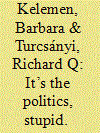

|
|
|
|
|
| Summary/Abstract |
The goal of this paper is to present an explanation of why the Muslim governments largely abstained from even bringing up the Uyghur case with China, while the Rohingya issue provoked official condemnations by the governments in many Muslim countries. Although economic factors are most often consulted internationally, this article puts forward political factors as sufficient to explain the Muslim governments’ responses to the Xinjiang issue – primarily the domestic politics, and secondarily seeking of strategic alternatives to balance the West. In the context of hybrid political regimes in many Muslim countries, the domestic public opinion played an important role in deciding whether the government would address the issue. Effectively only Turkey presents the case where the public pays attention to the Uyghurs, and the government felt obliged to raise the issue at least to some extent.
|
|
|
|
|
|
|
|
|
|
|
|
|
|
|
|
| 19 |
ID:
182829


|
|
|
|
|
| Summary/Abstract |
The article explores the political and diplomatic response from Kazakh and Kyrgyz governments towards China regarding its post-2014 Xinjiang security strategy. The policy, which includes repressive measures against Xinjiang Muslim minorities, has led to the detention of a significant number of ethnic Kazakh and Kyrgyz, thus calling for a reaction from their kin states. In order to explain the complexity of the problem, the article looks via a neorealist lens at the role of Kazakh and Kyrgyz human rights advocacy groups in urging local authorities to securely release ethnic Kazakh and Kyrgyz detained in Xinjiang's “vocational camps”. It further explores official responses from Kazakh and Kyrgyz governments, identifying their considerations and foreign policy choices. This article concludes that Kazakh and Kyrgyz governments neither possess economic and political leverage to press on China over the Xinjiang issue nor are they willing to do so as this may jeopardize their cooperation with China.
|
|
|
|
|
|
|
|
|
|
|
|
|
|
|
|
| 20 |
ID:
178919
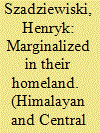

|
|
|
|
|
|
|
|